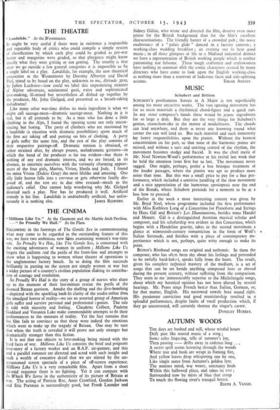THE _CINEMA
FOLLOWING in the footsteps of The Gentle Sex in commemorating what may come to be regarded as the outstanding feature of this war, we have two ambitious new films examining women's war-time role. So Proudly We Haii, like The Gentle Sex, is concerned with the exciting adventures of women in uniform ; Millions Like Us forgets the uniform and the perils of the front-line and attempts to show what is happening to women whose theatre of operations is the unglamorous factory bench. In so doing the film succeeds brilliantly in putting on the screen not simply women at war but a wider picture of a country's civilian population Slaking its contribu- tion of courage and resolution.
So Proudly We Hail is the story of a group of nurses who share up to the moment of their last-minute rescue the perils of the doomed Bataan garrison. Amidst the shelling and the dive-bombing —depicted with the sparkling back-lit clarity of the studio rather than the smudged horror of reality—we see an assorted group of American girls suffer and survive personal and professional agonies. The tale is told with sincerity and feeling. Claudette Colbert, Paulette Goddard and Veronica Lake make commendable attempts to fit their performances to the measure of reality. Yet the fact remains that the film fails to convince us that these were indeed the emotions which went to make up the tragedy of Bataan. One may be sure that when the truth is revealed it will prove not only stranger but dramatically stronger than this fiction. It is not that one objects to love-making being mixed with the hard facts of war.. Millions Like Us contains the brief and poignant love-story of a factory worker and an R.A.F. air-gunner, and this and a parallel romance are directed and acted with such insight and such a wealth of evocative detail that we are stirred by the un- accustomed screen spectacle of a piece of off-screen- experience. Millions Like _Usis a very remarkable film. Apart from a short air-raid sequence there is no fighting. Yet it can compare with In Which We Serve in the authenticity of its picture of Britain at war. The acting of Patricia Roc, Anne Crawford, Gordon Jackson and Eric. Portman is outstandingly good, but Frank Launder and
Sidney Gilliat, who wrote and directed the film, deserve even more praise for the British background than for the film's excellent characterisations. The friendly banter of a crowded pub ; the noisy exuberance of a " palais glide " danced in a factory canteen ; a working-class wedding breakfast ; an evening out to hear good music ; in all these glimpses of life in a Midland industrial district we have a representation of British working people which is neither patronising nor fulsome. These tough craftsmen and craftswomen have nothing in common vAth the comic characters created by many directors who have come to look upon the English working-class as nothing more than a reservoir of ludicrous faces and side-splitting


























 Previous page
Previous page